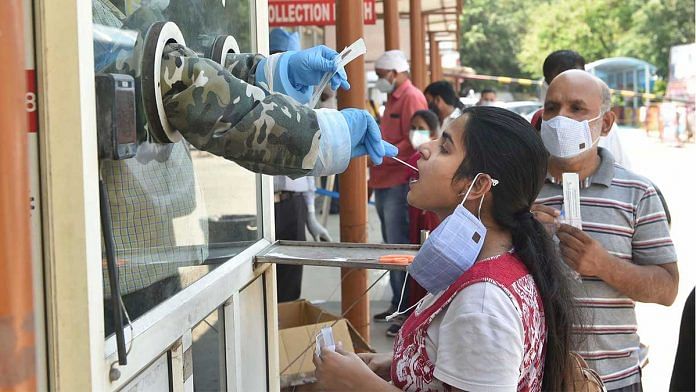New Delhi: Ever since it entered India’s Covid-19 arsenal in June last year, the rapid antigen test (RAT) has for long been the villain of the piece, with the Narendra Modi government repeatedly issuing “advisories” urging states to cut down on them and to rely on RT-PCR testing.
On Tuesday, however, the Indian Council for Medical Research (ICMR) revised the country’s testing strategy, advising antigen testing in all health facilities, both government and private, while calling for RAT booths to be set up in cities, towns and villages.
The booths, it said, should be set up in “RWAs, offices, schools, colleges, community centers and other available vacant spaces” and they should be operational 24/7 while care should be taken to avoid crowding.
The scaling up of antigen testing is a significant onward movement.
While the council has cited the pressure on testing infrastructure as the reason for the revision of its antigen testing outlook, scientists point out that RAT detects at least some variants better than RT-PCR. And it is a fact that a substantial part of the current Covid-19 surge is being fuelled by variants.
Experts also say that the fact that antigen tests, which were earlier meant only for containment zones and healthcare facilities, are now being advised everywhere is one of the most tell-tale signs that policymakers have now started factoring in community transmission, even though the official stand of the Modi government remains otherwise.
According to Dr K.S. Reddy, president, Public Health Foundation of India, and the Adjunct Professor of Epidemiology at Harvard, it is a sensible move but concerns about false negatives remain.
“It means that there is a heightened urgency of testing with widespread community transmission, not just through droplets but also through aerosols. In general this is a sensible move. It reflects what many of us have been saying on RT-PCR,” he said.
“The tricky part is on RAT negative persons. If clinically suspect, RT-PCR may be done as feasible but diagnosis should not hinge on that. Clinically suspect cases must be isolated and managed as high probability cases of Covid since RAT has a low negative predictive value while having a high positive predictive value,” he added. “Use tests sensibly, as both tests can be negative in a fairly large proportion of infected cases. Use clinical judgement too. Chest X Ray and CT scans should be used sparingly.”
Also read: Up to 530% spike in poll states, 152% after Holi — the big culprits in India’s new Covid wave
Modi govt had always been for less antigen tests
Antigen tests look for the presence of specific parts of a virus that generate the immune response in the body, especially antibodies. They have been preferred because they give results in 30 mins at the most but the propensity for false negatives has meant that experts and governments have been wary of its overuse.
Experts say it is possible that RATs can miss an infection in 50-60 per cent of cases. In December last year, the Modi government had said antigen tests should not make up more than 30-40 per cent of total tests. The letter from Health Secretary Rajesh Bhushan also said antigen tests should be avoided if a person has had symptoms for a week.
According to ICMR guidelines, the minimum acceptable criteria for RATs that are to be used only in the field without being transferred to a laboratory setup is a minimum sensitivity of 50 per cent and a minimum specificity of 95 per cent. Sensitivity is a measure of a test’s ability to detect true positives while specificity is its capacity to detect true negatives.
Explaining the reasons for the revised strategy, the ICMR says: “An unprecedented upsurge of Covid-19 cases and deaths is currently being witnessed across India. The overall nationwide test positivity rate is above 20%. Testing-tracking-tracing, isolation and home-based treatment of positive patients is the key measure to curb transmission of SARS-CoV-2, the causative agent of COVID-19.”
It adds: “As on today, India has a total of 2,506 molecular testing laboratories including RT PCR, TrueNat, CBNAAT and other platforms. The total daily national testing capacity is close to 15 lakh tests considering a three- shift operationalisation of the existing laboratory network. At present, the laboratories are facing challenges to meet the expected testing target due to extraordinary case load and staff getting infected with COVID-19.”
Restrictions on RT-PCR testing
The testing strategy now puts a bar on repeat RT-PCR tests on any person who has tested positive either with RT-PCR or RAT, for interstate travel of healthy individuals and for Covid-19 patients discharged from hospitals.
“RT-PCR is time consuming and labour intensive. Also RATs may be more useful for variants. For B1.1.7, we know for a fact that cycle threshold values are usually lower than that of D614G, which is the older variant. That means a higher viral load,” said Dr Gagandeep Kang, professor of microbiology at the Christian Medical College, Vellore.
“Chances are RATs may perform better for the variants and also do not waste time,” she added. “In the current situation where people are running around just to get tested and treatment is delayed because test reports are, it makes sense to use RAT because the turnaround time is less.”
She, however, concedes, that there are disadvantages. One being the fact that the RAT protocol does not include preservation of samples for future genome sequencing.
“For a molecular test there is the advantage of being able to sequence it later. When you send it for PCR you have the sample that’s retained in the lab and used for sequencing. With RAT, there is no protocol for storage of the sample,” she added.
(Edited by Arun Prashanth)
Also read: PSA oxygen plants — the cleaner, cheaper tech that could help ease India’s current crisis



